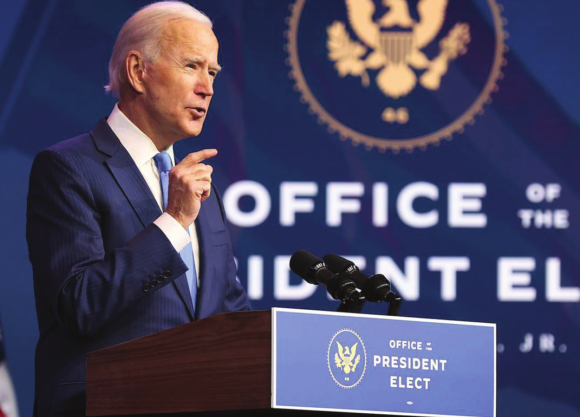One thing is certain: There will be change on a range of policies
As we flip the calendar to 2021, we are anticipating a new presidential administration, a divided Congress and a starkly different U.S. Supreme Court — a great time to speculate about what employers might expect to see in terms of legislation, enforcement and case law.
Typically, when the presidency shifts to a new party, there are big changes. When President Trump took office, he rolled back a number of Obama-era initiatives, so we can expect a boomerang effect with President-elect Biden restoring some of the more employee-friendly regulations.
First, the country is still in the throes of a pandemic. On Dec. 31, benefits such as Emergency Paid Family Leave, Emergency Paid Sick Leave and Pandemic Unemployment Assistance, which have been available since last spring, are set to expire. Between now and the end of the year, Congress might get it together enough to pass some type of continuing aid package. If not, a new Congress and a new administration can be expected to have that at the top of the list.

EEOC focus
The
Equal Employment Opportunity Commission has been the “steady Eddie” of
agencies in the shift from the Obama to the Trump administrations, with
much the same expected in the coming year. The types of cases filed with
the agency have remained similar in type, with some increase in sexual
harassment claims since the advent of the #MeToo era. Enforcement
efforts have remained steady with more direct actions and settlements in
sexual harassment cases over the last two years. We can expect to see,
however, in addition to a continued focus on ending sexual and other
harassment, renewed efforts to promote pay equity and diversity, equity
and inclusion.
Labor and NLRB
Candidate
Biden was endorsed by almost every major labor union. He ran on a
pro-union platform and will likely support regulations to make union
organizing easier. He has expressed support for the Protecting the Right
to Organize (PRO) Act, which is unlikely to pass given the anticipated
makeup of the Senate, which will not be known until the Georgia special
election in January.
Biden
will have the opportunity to appoint at least one member to the NLRB
early in his administration and likely more later. He will appoint the
NLRB general counsel, who will be in the powerful position of issuing
interpretive guidance on labor regulations. Issues on which there is
likely to be an about-face include the handling of internal
investigations, employee handbook policies, confidentiality mandates and
employee engagement on social media.
Minimum wage and employee classification
Candidate
Biden signaled his intent to seek an increase of the federal minimum
wage to $15 per hour. Again, with a Republican Senate or a slim margin
held by the Democrats, such legislation is unlikely to pass.
Unlike
other cabinet positions which may go to moderates, the Labor secretary
is likely to be someone with a strong union background. President Biden
may ask the DOL to revisit the salary test for exempt employees and
perhaps even review the duties test. A Biden Department of Labor may
also withdraw the recently proposed rule on independent contractor
classification if it is not finalized before the end of the year or,
alternatively, seek new rulemaking to make it more difficult to classify
individuals as contractors.
Immigration
Changes in immigration policy are imminent.
In
addition to restoring the Deferred Action for Childhood Revivals (DACA)
policy, the new president may seek to make the use of e-Verify
mandatory for most employers. Restrictions imposed by the Trump
administration on employment-based visas are likely to be loosened.
These include H-1B visas, to temporarily hire non-immigrant workers in
specialty occupations, H-4 visas for their spouses, L visas for
temporary workers, J visas for work- and study-based exchange visitor
programs; and H-2B visas for temporary non-agricultural workers.
Arbitration and the ACA
Although
there are not many important employment cases currently pending, the
U.S. Supreme Court heard oral arguments in California v. Texas and Texas
v. The United States on Nov. 10. These cases could decide the fate of
the Affordable Care Act.
The court will also decide a case that could have an impact on the efficacy of employment-based arbitration agreements.
The
Roberts court has been supportive of mandatory arbitration agreements
in the employment context. President-elect Biden supports the Forced
Arbitration Injustice Repeal (FAIR) Act, which was filed in 2019. This
law, if passed, would prohibit requiring employees to sign pre-dispute
arbitration agreements as a condition of employment. In a Republican, or
barely Democratic, Senate this bill will likely be doomed, so the
Supreme Court is expected to have the final word on arbitration for the
time being.
It is
always fun and interesting to speculate about what a new president will
attempt to do as he takes office and how successful he will be. It is
safe to say, however, that there will be change.
Charla
Stevens, a director at McLane Middleton and chair of its Employment Law
Practice Group, can be reached at 603-628-1363 or charla.stevens@mclane.com.
Candidate Biden signaled his intent to seek an increase of the
federal minimum wage to $15 per hour. With a Republican Senate or slim
margin held by Democrats, such legislation is unlikely to pass. Yet, a
Labor Secretary may withdraw a recently proposed rule on independent
contractor classification or seek new rulemaking to make it more
difficult to classify individuals as contractors.